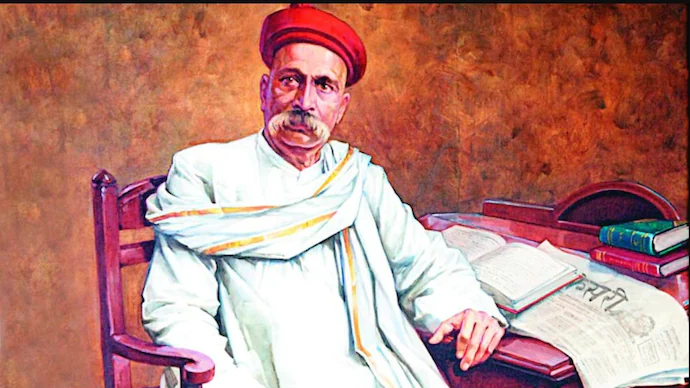SYLLABUS
GS-1:The Freedom Struggle – its various stages and important contributors /contributions from different parts of the country.
Context:
On 23rd July 2025, the Prime Minister paid tributes to Lokmanya Tilak on his 169th birth anniversary.
About Lokmanya Tilak

- Birth:
- Bal Gangadhar Tilak was born on July 23, 1856, at Ratnagiri, Maharashtra, in a middle-class family.
- The British colonial authorities called him “The father of the Indian unrest“.
- He was also conferred with the title of “Lokmanya“, which means “accepted by the people as their leader”.
- Mahatma Gandhi called him “The Maker of Modern India”.
- Jawaharlal Nehrucalled him “The Father of the Indian Revolution”
- Early Life and Career:
- The young Tilak attended Deccan College in Poona, where he completed a bachelor’s degree in mathematics and Sanskrit in 1876.
- He later pursued law at the University of Bombay (now Mumbai), earning his degree in 1879.
- In 1880, Bal Gangadhar Tilak, Gopal Ganesh Agarkar, and Vishnushastri Chiplunkar, established the New English School in Pune.
- He founded the Deccan Education Society (1884) with Gopal Ganesh Agarkar and others.
- Newspaper:
- Kesari (in Marathi)
- Mahratta (in English)
- Books:
- Gita Rahasya
- The Arctic Home in the Vedas
- The Orion: On the antiquity of the Vedas.
- Slogan:
- “Swaraj is my birthright, and I shall have it!”
- Ideology:
- Tilak aimed to broaden the appeal of the nationalist movement, which was largely limited to the upper classes, by incorporating Hindu religious symbolism and highlighting Maratha resistance against Muslim rule.
- He organized two major festivals, Ganesh in 1893 and Shivaji in 1895, to invoke Hindu identity and mobilize public opinion. While this popularized the movement, it also led to communal tensions, particularly with Muslims.
- Rise to national prominence:
- Tilak’s actions mobilized the Indian public but led to conflict with the British, resulting in his prosecution for sedition and imprisonment in 1897.
- In 1905, Tilak strongly backed the Bengali demand to reverse the Partition of Bengal and advocated for a national boycott of British goods.
- In 1906, he launched the Tenets of the New Party, promoting passive resistance to weaken British rule and prepare India for independence.
- Tilak aimed at swarajya (independence), not piecemeal reforms, and attempted to persuade the Congress Party to adopt his militant program.
- This led to clash with the Moderates during the Surat (now in Gujarat state) session of 1907, resulting in the party’s split.
- It divided the Moderates, led by Gopal Krishna Gokhale, advocating for gradual reforms, from the Extremists, led by Bal Gangadhar Tilak, Bipin Chandra Pal, and Lala Lajpat Rai, who favoured direct action and the Swadeshi movement against British rule.
- Exploiting the division in the nationalist ranks, the British again prosecuted Tilak on sedition charge and deported him to Mandalay, Burma (Myanmar), where he served a six-year prison sentence (1908-1914).
- After his release in 1914, he returned to active politics.
- In 1916, Tilak founded the Indian Home Rule League, demanding self-government on the lines of Irish Home Rule.
- Played a key role in the Lucknow Pact with the Muslim League under Mohammed Ali Jinnah, fostering Hindu-Muslim unity.
- In 1918, he traveled to England to seek support from British political parties, especially the Labour Party, for India’s cause.
- Tilak remained critical of Gandhi’s boycott of council politics, instead advocating “responsive cooperation” to push for constitutional reforms.
Source: The Hindu
http://inc.in/congress-sandesh/tribute/remembering-tilak-the-father-of-india-s-revolution-1

